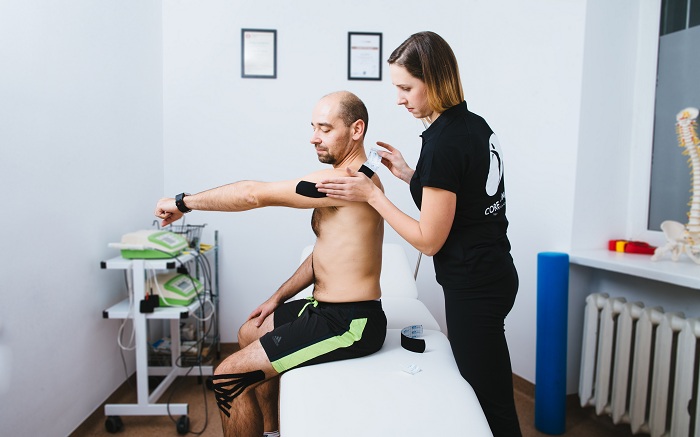Kinesiotaping in swimming
Kinesio Taping is relatively new therapeutic method. I is supposed that this method was created - according to different sources- in the 70s XX century. This method has quickly become popular among rehabilitants and sportsman. It has spread from Japan to other Asian countries and the USA, and then it has finally reached Europe. Kinesio Taping was becoming more and more popular among people interested in professional sport since it was introduced at XXIV Olympics in Seoul (1988). It was most often used to speed up sportsmen recovery and their return to trainings and competitions after different injuries or to prevent eventual injuries .
Tapes used for Kinesio Taping have particular parameters that make them similar to skin. One of the specific features of this tape is that its longitudinal stretchability is between 130% and 140% of its original length and lack of transverse stretchability. Thickness and weight of the tape improvise features of the human skin. Tape is made from cotton and elastic fibers without latex that minimizes a chance of allergic reaction . Acrylic glue that is activated by heat is spread on the plaster in undulatory manner. It is imitating papillary lines and allows the tape to shed the humidity. Thanks to those features tapes hold on to the skin 3 to 5 days what helps in continuation of the therapy. An improvement is visible immediately after applying Kinesio Tape and sustains the whole time when the tape is on the skin. It allows the therapists to act quickly even in acute states when the therapeutic procedures are very limited. Other methods can be used along with Kinesio Tape what fosters holistic approach to the therapy.
While watching media coverage from the biggest sporting events, we can see how common Kinesio Tape is, and that it is often applied to all the body parts of the sportsmen. Up to 2009 the tape was also used in swimming competitions. When FINA - Worlds Federal Swimming Organisation (FédérationInternationale de Natation) introduced new regulations regarding the specifications of the swimming attire, the approach towards using tapes including Kinesio Tape changed. Using the tapes during swimming competitions was strictly prohibited despite lack of any scientific evidence that Kinesio Tape stimulates the performance.
Kinesio Taping is a therapeutic method which - as it was said before - is present in many activities related to sport. It is sometimes used in the therapy of balance disturbances of the muscles , injuries of the locomotor system, fascial disturbances or the disturbances of blood and lymph flow.
One of the basic qualities of Kinesio Taping is the ability to influence muscular tonus , which is highly regarded by sports therapists. When we deal with increased or decreased muscular tonus, we can - by proper application of Kinesio tape - reach the optimal muscular tonus in particular set of muscles. Thanks to that we can help the muscles that have been weakened by some kind of contusion. It fosters recovery in adverse situations during the training cycle. It allows the competitor faster return to the full training capacity.
While discussing an example above there comes the question, does KT method have a stimulating effect on the muscles of the healthy sportsmen.
There is no scientific research regarding the influence of KT method on the muscular power of the swimmers. One trial on using KT in swimming was examining the changes taking place during particular parts of training, which can allow us to relate to the influence of this method
on the improvement of the results. This research is definitely not enough to come to any reliable conclusions regarding using KT in swimming trainings.
Kinesio Taping doesn't unequivocally influence the timings attained by swimmers. Swimmers also don't agree with each other in their subjective opinions regarding the improvement of the particular elements of swimming after applying the tape.
The conclusion is clear - even though the application of Kinesio Type is forbidden during swimming competitions - the tapes are very potent element of the therapy during training cycle in swimmers suffering from overextensions and contusions

